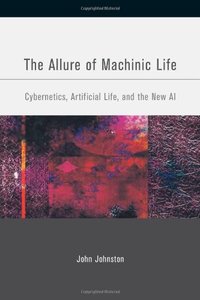 Zusammenfassungen
Zusammenfassungen
 In The Allure of Machinic Life, John Johnston examines new forms of nascent life that emerge through technical interactions within human-constructed environments--"machinic life"--in the sciences of cybernetics, artificial life, and artificial intelligence. With the development of such research initiatives as the evolution of digital organisms, computer immune systems, artificial protocells, evolutionary robotics, and swarm systems, Johnston argues, machinic life has achieved a complexity and autonomy worthy of study in its own right. Drawing on the publications of scientists as well as a range of work in contemporary philosophy and cultural theory, but always with the primary focus on the "objects at hand"--the machines, programs, and processes that constitute machinic life--Johnston shows how they come about, how they operate, and how they are already changing. This understanding is a necessary first step, he further argues, that must precede speculation about the meaning and cultural implications of these new forms of life. Developing the concept of the "computational assemblage" (a machine and its associated discourse) as a framework to identify both resemblances and differences in form and function, Johnston offers a conceptual history of each of the three sciences. He considers the new theory of machines proposed by cybernetics from several perspectives, including Lacanian psychoanalysis and "machinic philosophy." He examines the history of the new science of artificial life and its relation to theories of evolution, emergence, and complex adaptive systems (as illustrated by a series of experiments carried out on various software platforms). He describes the history of artificial intelligence as a series of unfolding conceptual conflicts--decodings and recodings--leading to a "new AI" that is strongly influenced by artificial life. Finally, in examining the role played by neuroscience in several contemporary research initiatives, he shows how further success in the building of intelligent machines will most likely result from progress in our understanding of how the human brain actually works. John Johnston is Professor of English and Comparative Literature at Emory University in Atlanta. He is the author of Carnival of Repetition and Information Multiplicity.
In The Allure of Machinic Life, John Johnston examines new forms of nascent life that emerge through technical interactions within human-constructed environments--"machinic life"--in the sciences of cybernetics, artificial life, and artificial intelligence. With the development of such research initiatives as the evolution of digital organisms, computer immune systems, artificial protocells, evolutionary robotics, and swarm systems, Johnston argues, machinic life has achieved a complexity and autonomy worthy of study in its own right. Drawing on the publications of scientists as well as a range of work in contemporary philosophy and cultural theory, but always with the primary focus on the "objects at hand"--the machines, programs, and processes that constitute machinic life--Johnston shows how they come about, how they operate, and how they are already changing. This understanding is a necessary first step, he further argues, that must precede speculation about the meaning and cultural implications of these new forms of life. Developing the concept of the "computational assemblage" (a machine and its associated discourse) as a framework to identify both resemblances and differences in form and function, Johnston offers a conceptual history of each of the three sciences. He considers the new theory of machines proposed by cybernetics from several perspectives, including Lacanian psychoanalysis and "machinic philosophy." He examines the history of the new science of artificial life and its relation to theories of evolution, emergence, and complex adaptive systems (as illustrated by a series of experiments carried out on various software platforms). He describes the history of artificial intelligence as a series of unfolding conceptual conflicts--decodings and recodings--leading to a "new AI" that is strongly influenced by artificial life. Finally, in examining the role played by neuroscience in several contemporary research initiatives, he shows how further success in the building of intelligent machines will most likely result from progress in our understanding of how the human brain actually works. John Johnston is Professor of English and Comparative Literature at Emory University in Atlanta. He is the author of Carnival of Repetition and Information Multiplicity. Dieses Buch erwähnt ...
Dieses Buch erwähnt ...
 Dieses Buch erwähnt vermutlich nicht ...
Dieses Buch erwähnt vermutlich nicht ... 
 Nicht erwähnte Begriffe | Intelligenz |
 Tagcloud
Tagcloud
 Zitationsgraph
Zitationsgraph
 Zitationsgraph (Beta-Test mit vis.js)
Zitationsgraph (Beta-Test mit vis.js)
 1 Erwähnungen
1 Erwähnungen 
- Cyber-Proletariat - Global Labour in the Digital Vortex (Nick Dyer-Witheford) (2015)

 Volltext dieses Dokuments
Volltext dieses Dokuments
 Bibliographisches
Bibliographisches 
 Beat und dieses Buch
Beat und dieses Buch
Beat hat dieses Buch während seiner Zeit am Institut für Medien und Schule (IMS) ins Biblionetz aufgenommen. Beat besitzt kein physisches, aber ein digitales Exemplar. (das er aber aus Urheberrechtsgründen nicht einfach weitergeben darf). Es gibt bisher nur wenige Objekte im Biblionetz, die dieses Werk zitieren.











 Aibo
Aibo Computer
Computer Evolution
Evolution Künstliche Intelligenz (KI / AI)
Künstliche Intelligenz (KI / AI) Künstliches Leben (Artificial life)
Künstliches Leben (Artificial life) machine learning
machine learning Maschine
Maschine Perceptron
Perceptron Philosophie
Philosophie Synthetische Biologie
Synthetische Biologie






 , 2231 kByte)
, 2231 kByte) 



 Biblionetz-History
Biblionetz-History